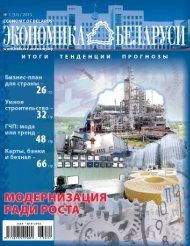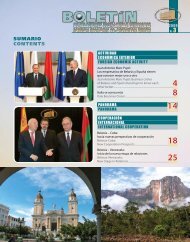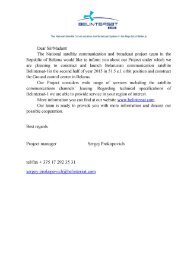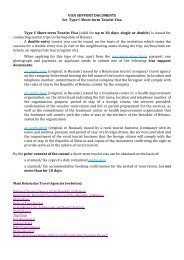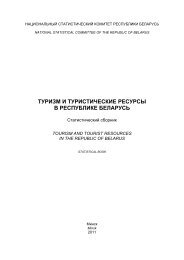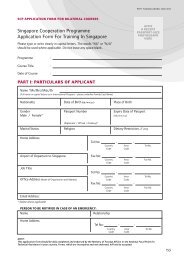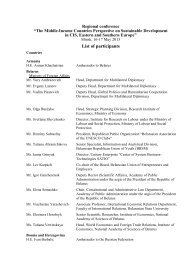Human Development Report 2013 - UNDP
Human Development Report 2013 - UNDP
Human Development Report 2013 - UNDP
You also want an ePaper? Increase the reach of your titles
YUMPU automatically turns print PDFs into web optimized ePapers that Google loves.
Woods institutions, the United Nations andother international bodies.Active civil society and social movements,both national and transnational, are using themedia to amplify their calls for just and fairgovernance. The spread of movements andthe increase in platforms for vocalizing keymessages and demands challenge governanceinstitutions to adopt more-democratic andmore-inclusive principles. More generally,a fair and less unequal world requires spacefor a multiplicity of voices and a system ofpublic discourse.The rise of the South presentsnew opportunities for generatinga greater supply of public goodsA sustainable world requires a greater supplyof global public goods. Global issues todayare increasing in number and urgency, frommitigation of climate change and internationaleconomic and financial instability to the fightagainst terrorism and nuclear proliferation.They require a global response. Yet in manyareas, international cooperation remains slowand at times dangerously hesitant. The rise ofthe South presents new opportunities for moreeffectively providing global public goods andfor unlocking today’s many stalemated globalissues.Publicness and privateness are in most casesnot innate properties of a public good but socialconstructs and as such represent a policychoice. National governments can step in whenthere is underprovision at the national level.But when global challenges arise, internationalcooperation is necessary—and can happen onlythrough the voluntary actions of many governments.Given the many pressing challenges,progress in determining what is public andwhat is private will require strong, committedpersonal and institutional leadership.* * *This <strong>Report</strong> presents the contemporary globalcontext and charts a path for policymakers andcitizens to navigate the increasing interconnectednessof the world and to face the growingglobal challenges. It describes how the dynamicsof power, voice and wealth in the world arechanging—and identifies the new policies andinstitutions necessary to address these 21stcentury realities and promote human developmentwith greater equity, sustainability andsocial integration. Progress in human developmentrequires action and institutions at boththe global and national levels. At the globallevel, institutional reforms and innovation arerequired to protect and provide global publicgoods. At the national level, state commitmentto social justice is important, as is the understandingthat one-size-fits-all technocraticpolicies are neither realistic nor effective giventhe diversity of national contexts, cultures andinstitutional conditions. Nevertheless, overarchingprinciples such as social cohesion, statecommitment to education, health and socialprotection, and openness to trade integrationemerge as means of navigating towards sustainableand equitable human development.The rise of theSouth presents newopportunities for moreeffectively providingglobal public goods andfor unlocking today’s manystalemated global issuesOverview | 9



